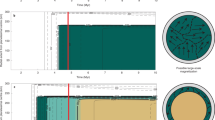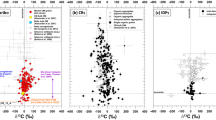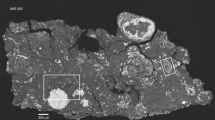Abstract
CARBONACEOUS chondrites, although comprising only about 2% of known meteorites, are extremely interesting for scientific investigation. Their mineral constitution, and the correspondence between their bulk chemical composition and the solar abundance of condensable elements, indicate that minimum chemical fractionation and thermal alteration have occurred. The mineral phases observed in these primitive chondrites are sufficiently unique, with respect to other meteorite classes, to have elicited considerable speculation about the physical environment in which they formed1–7.
This is a preview of subscription content, access via your institution
Access options
Subscribe to this journal
Receive 51 print issues and online access
$199.00 per year
only $3.90 per issue
Buy this article
- Purchase on Springer Link
- Instant access to full article PDF
Prices may be subject to local taxes which are calculated during checkout
Similar content being viewed by others
References
Mason, B., J. geophys. Res., 65, 2915 (1960).
DuFresne, E. R., and Anders, E., Geochim. cosmochim. Acta, 23, 200 (1961).
Ringwood, A. E., Geochim. cosmochim. Acta, 24, 159 (1961).
Mason, B., Space Sci. Rev., 1, 621 (1962).
DuFresne, E. R., and Anders, E., Geochim, cosmochim. Acta, 26, 1085 (1962).
Anders, E., A. Rev. astron. Astrophys., 9, 1 (1971).
Kerridge, J. F., Nature phys. Sci., 230, 66 (1971).
Urey, H. C., The Planets, 114–162 (Yale University Press, New Haven, 1952).
Jeffery, P. M., and Anders, E., Geochim. cosmochim. Acta, 34, 1175 (1970).
Kerridge, J. F., Nature, 239, 44 (1972).
Lovering, J. F., and Parry, L. G., Geochim. cosmochim. Acta, 26, 361 (1962).
Larson, E. E., Watson, D. E., Herndon, J. M., and Rowe, M. W., Earth planet. Sci. Lett., 21, 345 (1974).
Larson, E. E., Hoblitt, R. P., and Watson, D. E., Geophys. J. (in the press).
Taylor, L. A., Carnegie Instn Wash., 259–270 (1968).
Taylor, L. A., Carnegie Instn Wash., 287–289 (1970).
Cameron, A. G. W., in Origin and Distribution of the Elements, (edit. by Ahrens, L. H.), 125 (Pergamon, New York, 1968).
Bostrom, K., and Fredriksson, K., Smithson. misc. Collns, 151, 151 (1966); Kerridge, J. F., Earth planet. Sci. Lett., 9, 299 (1970).
Kerridge, J. F., Meteoritics, 5, 149 (1970).
Folinsbee, R. E., Douglas, J. A. V., and Maxwell, J. A., Geochim. cosmochim. Acta, 31, 1625 (1967).
Ramdohr, P., J. geophys. Res., 68, 2011 (1963).
Monster, J., Anders, E., and Thode, H. G., Geochim. cosmochim. Acta, 29, 773 (1965).
Author information
Authors and Affiliations
Rights and permissions
About this article
Cite this article
HERNDON, J., ROWE, M., LARSON, E. et al. Origin of magnetite and pyrrhotite in carbonaceous chondrites. Nature 253, 516–518 (1975). https://doi.org/10.1038/253516a0
Received:
Accepted:
Issue Date:
DOI: https://doi.org/10.1038/253516a0
This article is cited by
-
Formation of iron sulphide in solar nebula
Nature (1976)
Comments
By submitting a comment you agree to abide by our Terms and Community Guidelines. If you find something abusive or that does not comply with our terms or guidelines please flag it as inappropriate.



